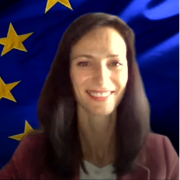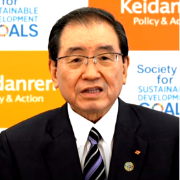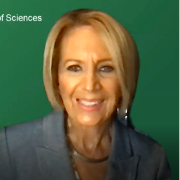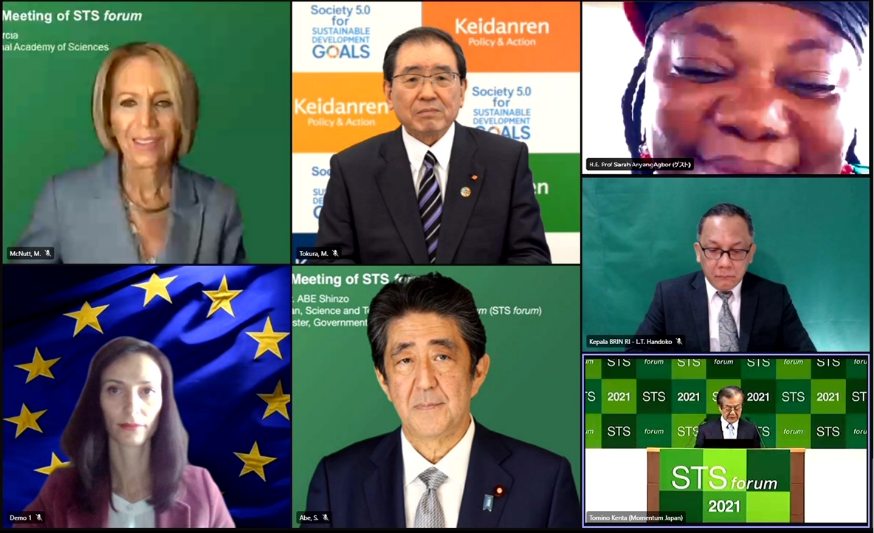
The rapid progress of science and technology has brought economic growth and enriched the quality of our lives. On the other hand, such advances have also produced new challenges such as environmental and data security issues. Taking these to be “the lights and shadows of science and technology,” we must develop the lights while controlling the shadows.
The Science and Technology in Society forum (STS forum), was founded in 2004 by Koji Omi, a former Minister of Finance and former Minister of State for Science and Technology Policy in the Japanese government. STS forum holds an annual meeting in Kyoto every October, bringing together global opinion leaders consisting of not only scientists, but also policymakers, business leaders, university presidents, research institute directors, science and technology investment foundations, and the media to discuss the benefits of advances in science and technology, and also the issues they newly raise. In 2021, Hiroshi Komiyama took over as Chairman, and STS forum has been taking on new challenges, in particular, focusing on the necessity of synthetic perspective and of breaking silos existing everywhere, which would benefit humankind through combining the vast and wide-ranging wisdom and knowledge. Furthermore, STS forum is going beyond its conventional framework and calling for participation not only from the fields of science and technology, but also economics and art and culture.
As was the case in 2020, this year’s annual meeting was held online due to the ongoing COVID-19 pandemic. 1,400 participants from 125 countries, regions and international organizations attended the meeting, including 25 Nobel Laureates. This year’s themes included tackling infectious diseases; global healthcare initiatives; developing science and technology talent in emerging economies; the social challenges brought about by the digital revolution; disruptive industrial technologies; life-long learning amid major changes of science and technology and society; and the need to synthesize fragmented and enormous knowledge with a clear vision.
The opening session was held on the theme of Science and Technology for the Future of Humankind. The chair of the session was Prof. Hiroshi Komiyama, Chairman, STS forum, and the speakers were Mr. Shinzo Abe, former Prime Minister, Government of Japan and Honorary Chairman, STS forum; Prof. Sarah Mbi Enow Anyang Agbor, Commissioner, Human Resources, Science and Technology, African Union Commission (AUC); Prof. Laksana Tri Handoko, Chairman, National Research and Innovation Agency (BRIN) and former Chairman, Indonesian Institute of Sciences (LIPI); Ms. Mariya Gabriel, Commissioner for Innovation, Research, Culture, Education and Youth, European Commission; Mr. Masakazu Tokura, Chairman, KEIDANREN (Japan Business Federation) and Chairman of the Board, Sumitomo Chemical Co., Ltd.; and Dr. Marcia McNutt, President, National Academy of Sciences, U.S.A.
-

[Chair] Prof. Hiroshi Komiyama, Chairman, Science and Technology in Society forum (STS forum), Japan
-

Mr. Shinzo Abe, former Prime Minister, Government of Japan; Honorary Chairman, Science and Technology in Society forum (STS forum), Japan
-

Prof. Sarah Mbi Enow Anyang Agbor, Commissioner, Human Resources, Science and Technology, African Union Commission (AUC), Ethiopia
-

Dr. Laksana Tri Handoko, Chairman, National Research and Innovation Agency (BRIN); former Chairman, Indonesian Institute of Sciences (LIPI), Indonesia
-

Ms. Mariya Gabriel, Commissioner for Innovation, Research, Culture, Education and Youth, European Commission, EU
-

Mr. Masakazu Tokura, Chairman, KEIDANREN (Japan Business Federation); Chairman of the Board, Sumitomo Chemical Co., Ltd., Japan
-

Dr. Marcia McNutt, President, National Academy of Sciences, U.S.A.
In their remarks, the speakers discussed the lights and shadows of science and technology, ultimately emphasizing the power of science and technology to overcome global crises, such as the COVID-19 pandemic, and to illuminate the path forward for the future. Furthermore, they stressed the importance of innovation, and several speakers shared examples of initiatives to promote innovation in their respective countries and regions. There was also discussion of analysis and synthesis, and breaking silos, two new themes of this year’s STS forum, and their importance for combining the vast and wide-ranging knowledge of humankind. Another theme echoed by several speakers was the power of international collaboration, which enabled the development of COVID-19 vaccines at an unprecedented speed. In addition, the speakers talked about the need to harness all talent for science and technology, and to overcome barriers to that by addressing disparities in education and access to resources. Finally, the need to tackle misinformation and disinformation, an issue that has been highlighted by public mistrust and misunderstanding of the COVID-19 vaccine, was also raised.

Opening Session: Science and Technology for the Future of Humankind
This was followed by Session 101 – Green Recovery for Sustainable Society, chaired by Dr. Henry A. McKinnell, former Chairman & CEO of Pfizer and former Chairman of Moody's. The speakers called for a greater sense of urgency and a focus on actions to tackle the crises facing the planet and humankind, including climate change, water issues, biodiversity collapse, economic recession, and the COVID-19 pandemic. Several speakers expressed dismay at the slow pace of progress in tackling the climate crisis in particular. The speakers shared potential ways forward and initiatives from their respective countries, regions and organizations. The measures proposed by the speakers included public pressure on politicians and governments for policy changes, stronger regulation and taxation, better carbon and ecosystem accounting, greener and more sustainable personal choices, sustainable technologies and investment to implement and scale them, and an all-disciplines-approach to policymaking. The point was also made that long-term perspectives and planning are essential for achieving an environmentally, socially and economically sustainable recovery.
-

[Chair] Dr. Henry A. McKinnell, former Chairman & CEO, Pfizer; former Chairman, Moody's, U.S.A.
-

Prof. Steven Chu, Professor of Physics and Molecular & Cellular Physiology, Department of Physics, Stanford University, U.S.A. [Nobel Laureate 1997 (Physics)]
On the following day was Session 200A – Breaking Silos in Education: Lifelong Active Learning in Inclusive Society, and Mr. Wenchi Chen, Chairman and President of VIA Technologies, Inc., in Taiwan chaired the session. The speakers discussed the transformations taking place in educational institutions and the importance of ensuring fair and inclusive learning. Due to the COVID-19 pandemic, this topic has come to the forefront with the shift to remote education. Drawing on their deep backgrounds in research and education, several of the speakers suggested cooperation across disciplines, communities, local and national governments, as well as between researchers and educators, in order to find the best education solutions for a given society. They spoke to the urgency of addressing inequalities in education, as, even in developed countries, the disparities have widened since the start of the pandemic. Several points were made regarding the great progress made possible by technological innovations in education, but the inherent dangers posed by misinformation and the difficulties of leveling the playing field of technological literacy were also noted. As the shift back to in-person education continues, we must consider the lessons learned through remote learning, and find the ideal balance for a reimagined education system.
-

[Chair] Mr. Wenchi Chen, Chairman and President, VIA Technologies, Inc., Taiwan
-

Prof. Joachim Frank, Professor, Biochemistry and Molecular Biophysics & Biological Sciences, Columbia University, U.S.A. [Nobel Laureate 2017 (Chemistry)]
Another session on the second day was Session 201 – Global Pandemic – Lessons Learned and Forecast (Preparedness), chaired by Dr. Ruth Narmann, Deputy Head of the Department of International Relations in the German National Academy of Sciences Leopoldina, on behalf of Prof. Dr. Gerald H. Haug, President of Leopoldina. The speakers reflected on the lessons of the pandemic, noting collective failures across prevention, preparedness and response, despite longstanding warnings from scientists that such a pandemic could occur. At the same time, they saw reasons for hope, such as the many technological advancements and innovations the pandemic has spurred, including the unprecedentedly rapid development of COVID-19 vaccines, made possible by extensive collaboration and years of investment in science and technology, including basic research. Looking ahead to potential future pandemics, the speakers noted the importance of placing science at the heart of policymaking, responding to pandemics flexibly and with an open mind, continually investing in biomedical research and public health infrastructure, better national and global planning and coordination, and ensuring equitable access to countermeasures in real-time. There was also a strong call for more active public engagement and communication to foster trust and to combat incorrect information. Several speakers noted the power of social media in particular, both for communicating correct scientific information but also disseminating misinformation and disinformation.
-

[Chair] Dr. Ruth Narmann, Deputy Head, Department of International Relations, German National Academy of Sciences Leopoldina, Germany (Chaired on behalf of President Haug)
-

Dr. Anthony S. Fauci, Director, National Institute of Allergy and Infectious Diseases (NIAID), U.S.A.
In Session 301 – Enhancing Collaboration in Global Health, chaired by Prof. K. VijayRaghavan, Principal Scientific Adviser to the Government of India, speakers noted that while the speed of vaccine development in response to the COVID-19 pandemic had been miraculous, this achievement had been somewhat overshadowed by concerns regarding equitable access to the vaccines, with export bans and lack of transparency from manufacturers hampering efforts to get vaccines distributed globally, leading to a risk of further deadly variants occurring. There were also concerns raised about the lack of self-sufficiency in regulatory, scientific, and production capabilities, as well as viral surveillance and diagnostic capabilities globally. The need for greater international public-private research efforts was also highlighted by the speakers, as well as the need for ongoing drug development to create a wide portfolio of drugs to mitigate serious global concerns regarding antimicrobial resistance.
-

[Chair] Prof. K. VijayRaghavan, Principal Scientific Adviser to the Government of India, India
-

Professor Shinya Yamanaka, Director and Professor, Center for iPS Cell Research and Application (CiRA) Kyoto University, Japan [Nobel Laureate 2012 (Physiology or Medicine)]
Session 302A – Lights and Shadows of Digital Economy was chaired by Ms. Eva Kaili, Chair of Science and Technology Options Assessment (STOA) of European Parliament, and it broached wide-ranging topics covering a multitude of emerging technologies, such as the internet of things, blockchain, big data and notably, AI, and their impact of society. Calls to heed the impacts from the digital divide, inequity and other growing disparities were shared by the speakers. The opportunities for business and industry from these technologies were discussed as well as the need to regulate in the face of cross-border data flows and international value chains, and disruptive technologies to the global financial system, such as stable coins. Data security from cyberattacks and data protection for citizens’ privacy was also considered by the speakers as transparency in research as well as transparency in data use by controlling powers was explored. Humanities biases were discussed in relation to such biases being incorporated by machine learning systems and also as a point of weakness in protection from influence from AI and cyberattacks. Furthermore, education to upskill human resources and to ensure social acceptance of transformation in the digital economy was brought to light, and the spread of misinformation and undermining of scientific truth as digitalization advanced during the pandemic were also discussed.
-

[Chair] Ms. Eva Kaili, Chair, Science and Technology Options Assessment (STOA), European Parliament, Belgium
-

Dr. Holden Thorp, Editor-in-Chief, Science Family of Journals, Science / American Association for the Advancement of Science (AAAS), U.S.A.
Session 401 – Collaboration among Academia, Industries and Government, chaired by Prof. Harriet Wallberg, Professor and former President of the Karolinska Institutet in Sweden, was held on the fourth and final day. The speakers agreed that collaboration in previous pandemics, such as in facing HIV and Ebola, had created a network that allowed for rapid support and response to the COVID-19 crisis, and that collaboration with the goal of addressing the needs of the planet and humankind would be essential in future crises, but collaboration when there is not a crisis is also needed. The panelists also agreed that research and education, especially relating to basic sciences, would be essential in order to boost future collaboration and response to pandemics and climate change. Several questions were raised, including the issue of tackling fake news. The panelists agreed that the results of collaboration would lead to greater trust in scientists, as seen in the cooperation on the pandemic. Even if naysayers confront the science, action must be based on scientific advice, and the results will influence the population. The panelists also agreed that social sciences and humanities would be essential in behavioral changes and impacts on collaboration.
-

[Chair] Prof. Harriet Wallberg, Professor and former President, Karolinska Institutet, Sweden
-

Dr. Paul Stoffels, Executive Vice President and Chief Scientific Officer, Johnson & Johnson, U.S.A.
The closing session was chaired by Dr. Ismail Serageldin, founding director of the Library of Alexandria. The speakers were Mr. Marcelo Luis Ebrard Casaubon, Minister of Foreign Affairs of Mexico, Mr. Terry Brady, President and CEO of Underwriters Laboratories Inc., Professor Cherry A. Murray, Deputy Director for Research at the University of Arizona, Dr. Ashwani Kumar, Senior Advocate of the Supreme Court of India, Mr. Takeshi Uchiyamada, Chairman of the Board of Toyota Motor Corporation, Dr. Maria Papadopoulou, Policy Officer of Directorate-General for Research and Innovation at the European Commission, and Prof. Pedro Henrique Brancalion, Professor of Forest Sciences at the University of Sao Paulo.
-

[Chair] Dr. Ismail Serageldin, Founding Director Emeritus, The Library of Alexandria, Egypt
-

Mr. Marcelo Luis Ebrard Casaubon, Minister of Foreign Affairs, Government of Mexico, Mexico

Session 403: Closing (Key Messages from the 18th Annual Meeting)
From left top to right bottom, Dr. Ismail Serageldin, Mr. Takeshi Uchiyamada, Prof. Pedro Henrique Brancalion (Young Leader), Dr. Maria Papadopoulou (Young Leader), Mr. Marcelo Luis Ebrard Casaubon, Prof. Cherry A. Murray, Dr. Ashwani Kumar, Mr. Terry Brady
The speakers commended the organizers and thanked the Chairman for organizing the 18th STS forum amid the COVID-19 pandemic once again, emphasizing that despite the pandemic, a wide variety of stakeholders were able to take part in an online format. Each of the speakers shared their respective views of what they had experienced and witnessed during the discussions held over the last four days. They noted that many of the discussions had emphasized that the future of society is linked with the advancements in science, technology and innovation, but newly accelerating technologies can create new obstacles and unforeseen consequences that must be addressed together. Many of the speakers also shared the view that social sciences and humanities would be essential to gain public support and create behavioral changes in society, and that scientists must communicate and share the results of scientific work with the wider public in order to gain support for collaboration and make progress on addressing existential crises facing humanity, such as the pandemic, climate change, and the quest for carbon neutrality.
The 19th Annual Meeting of STS forum is scheduled to be held in Kyoto from Sunday, October 2, to Tuesday, October 4, 2022.
